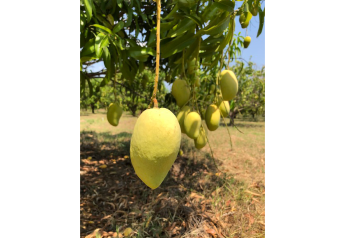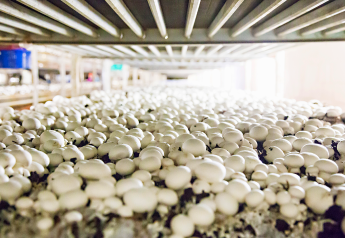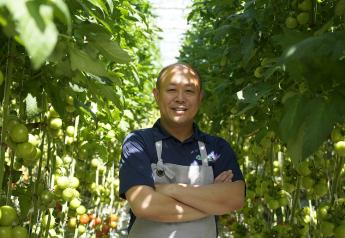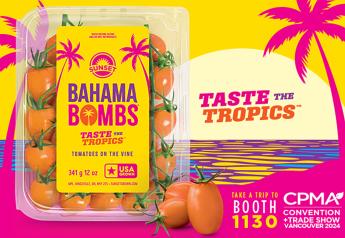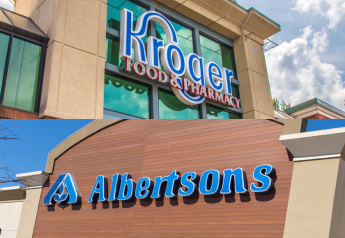Retailers launch new packaging initiatives in the produce aisle
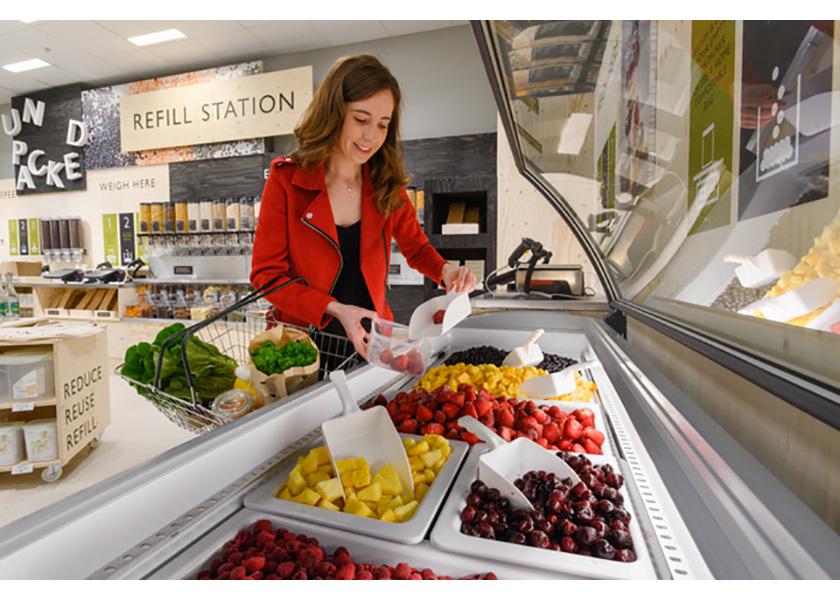
Estimated reading time: 6 minutes, 59 seconds
Overview:
- What retailer recycling initiatives might mean for the end consumer;
- From social media to point of sale to in-store marketing - the different ways retailers can educate shoppers about their sustainability practices;
- Read about a variety of successful sustainability initiatives retailers have implemented;
- Tips and tricks to success in the produce and bulk departments;
- Greenpeace USA's top major American supermarkets and their efforts to reduce plastic - see who made the grade; and,
- Other initiatives, including: Loop from TerraCycle, Unpacked from Waitrose, Fill your own from Marks & Spencer and more.
Single-use, plastic packaging is increasingly under fire. Some consumers are realizing that plastic, which will exist for centuries after it’s used, may not be the ideal material to wrap food that will be consumed in minutes.
Retailers are taking notice, introducing packaging options and doing what they can to educate shoppers about their choices, especially when it comes to produce and how they can make a difference.
As part of sustainability initiatives, many retailers are making promises. These include pledges from companies such as Walmart, Kroger, Target and Aldi to have a certain percentage of their private label packaging be recyclable, reusable or compostable by a year – often 2025. The challenge with goals like these is that many so-called recyclable packages are not, in fact, recycled.

It’s not all doom and gloom though. Jimbo’s takes reducing single-use plastic to heart. In 2019, the four-unit, San Diego-based retailer announced a plastic-free water aisle and works to reduce packaging in every department, including produce.
Sustainability Coordinator Stephanie Morris focuses on what consumers can do with packaging after they’ve used it. While there’s no perfect choice for a package that’s used to temporarily hold something that’s eaten then discarded, she tries to educate consumers that eschewing plastic is a big mindset shift “because of the convenience we’re used to.” She talks to customers about it becoming a mindfulness activity.
In the produce department, Jimbo’s has considered compostable packaging versus plastic/recyclable products. But it’s almost a wash, Morris says, as compostables often end up in the landfill since few consumers compost at home, and plastic is often not recycled.
Jimbo’s also features compostable bags in its bulk section and non-GMO Project Verified, plant-based bags for produce. But Morris has had to educate shoppers that there’s a downside to these bags: You can’t use them in the same way as a plastic bag.
“You can’t wrap lettuce in a plant-based bag because it wilts,” she said. There’s signage in the stores and social media videos about the bags, which the retailer introduced in September 2019.
As a result, Jimbo’s has shifted to old-school methods, encouraging consumers to wrap produce in a reusable damp cloth to store it at home.

The stores do all they can to educate consumers, but, said Morris, “it’s a fine line between bursting everyone’s bubble and expanding that bubble.”
The small chain uses social media — mostly Instagram and Facebook — and email blasts, especially if stores change any packaging. Jimbo’s also furnishes all employees with any packaging change information, “so when we get questions, in-store staff have the confidence to give information, rather than just saying it came from corporate,” Morris says. “The conversations we have are important.”
Social media is a great tool because it boosts engagement, Morris points out. “We invite people to share their ideas and that engagement has been huge for us. It also gives our social media coordinator a chance to respond and try to educate one on one sometimes.” And sometimes, customers spur change, Morris adds. “Sometimes, [they] are the catalyst of why we think about changing something from plastic.”
Reusable at retail
New Seasons Market is helping reduce plastic waste through its “Ditch the Disposables” program. The Portland, Ore.-based retailer launched this program four years ago in partnership with GO Box and now runs it at all of its Oregon and Washington state stores.
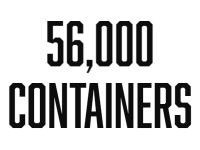
Through “Ditch the Disposables,” customers take ready-to-eat food in reusable containers, and then return the packages to the store, where they’re collected by GO Box for washing and sanitizing. Consumers subscribe to GO Box and use the packages for self-serve items such as the salad bar, hot bar and olive bar, as well as at the stores’ full-service chef’s cases. This has saved 56,000 containers since the program launched, said Athena Petty, senior sustainability program manager.
To educate shoppers about the program, New Seasons used in-store marketing collateral including posters; promoted the program in weekly ads; and launched an education program for staff so they would be able to talk to customers about it and answer questions.
In the produce and bulk departments, New Seasons keeps waste down by offering high-quality, reusable products for purchase, such as Stasher-brand reusable bags.
“We routinely evaluate our packaging choices and make or revise decisions based on the best available science or data,” said Petty. “Sustainable practices are also a constant conversation with our customers — the initiatives we support across our stores to reduce packaging prompt conversations, often in our front-end and prepared food departments.”
Sprouts Farmers Market, which has around 380 stores, invites guests to bring in their own reusable containers for produce or bulk products, and in most stores, the company offers reusable cloth bags, mesh bags and glass containers, which consumers can buy, fill and then reuse.
Sprouts aims to include at least 30% recycled content in its private-label packaging, and requests that fiber-based packaging be sourced from certified responsible sources.
The Phoenix, Ariz.-based retailer also partners with How2Recycle to provide guidance to customers on how to properly recycle Sprouts’ private-label packaging and last year, launched 172 items with the How2Recycle logo.
Making the grade
Earlier this year, Greenpeace USA ranked major American supermarkets on their efforts to reduce plastic.
Topping the list was Giant Eagle, which made a huge leap from 16th place. The Pittsburgh, Pa.-based retailer is working with Fifth Season to reduce plastic packaging on leafy greens by 40% per package. It’s also moved to biodegradable, compressed, recycled paper for its Great to Go meal kits and is working on sustainable private label packaging.
Albertsons Cos. is making meaningful changes in what it uses for shipping. Its Southern California division uses a closed-loop program to recycle No.5 polypropylene crates used to ship fruits and vegetables. Once it’s emptied the crates, a store sends them to be recycled into plastic pellets that are then used to manufacture new crates. The Boise, Idaho-based chain is also introducing recycled content into packaging, such as its O Organics lettuce containers.
Aldi, often maligned for using too much plastic, has launched packaging with 44% less plastic for its mixed bell peppers. The company, whose U.S. headquarters is in Batavia, Ill., says it also uses 20% less packaging for blueberries and tomatoes. Additionally, Aldi has eliminated all Styrofoam produce packaging, as well as a million plastic trays used for asparagus packaging.
Other initiatives
Loop, a program from TerraCycle, aims to reduce packaging by making it reusable. Consumers buy products in reusable containers, which they return to a store when they’re empty.
Kroger has partnered with TerraCycle in its Fred Meyer stores to encourage the recycling of plastic packaging from its private label.
Encouraging customers to refill their own containers — for bulk products or produce — is arguably the best thing retailers can do because the net result is zero plastic waste.
In the United Kingdom, where most produce comes wrapped in plastic, retailer Waitrose has launched Unpacked aisles in four stores, where customers fill their own containers with anything from produce to oats.
And British retailer Marks & Spencer now offers “Fill Your Own” at 14 of its stores, where it claims to sell 25 of 45 products in higher volumes than their packaged alternatives, and for cheaper prices. Products include nuts, frozen fruit and pasta.
The biggest obstacle to refill stations, says Sian Sutherland, co-founder of the campaign group A Plastic Planet, London, is to make this the new normal. “What is needed is a 21st century execution of the refill revolution, giving shoppers an elevated and rewarding experience so you feel like you are shopping in the future, not in the 1950s.”
More British moves
Plastic packaging is more prominent in United Kingdom produce aisles than in the U.S., with many products, from apples to broccoli, wrapped in plastic.
However, some retailers are making strides. Earlier this year, Tesco reported that it has removed 1.6 billion pieces of plastic from its business, using its “4Rs” packaging strategy to: “Remove plastic where possible; Reduce where it can't; Reuse; and Recycle anything remaining.”
Tesco informed its suppliers of its preferred packaging materials and also reserves the right to stop stocking products that use too much packaging or packaging that’s hard to recycle.
To date, Tesco has removed 42 million plastic forks from prepared salads, replacing them with wooden alternatives, and has removed millions of plastic containers from products such as peaches, plums and tomatoes.
Sainsbury’s has removed single-use, plastic produce bags and replaced them with reusable bags made from recycled bottles. The company has also eliminated plastic film from broccoli, switching instead to loose broccoli.


